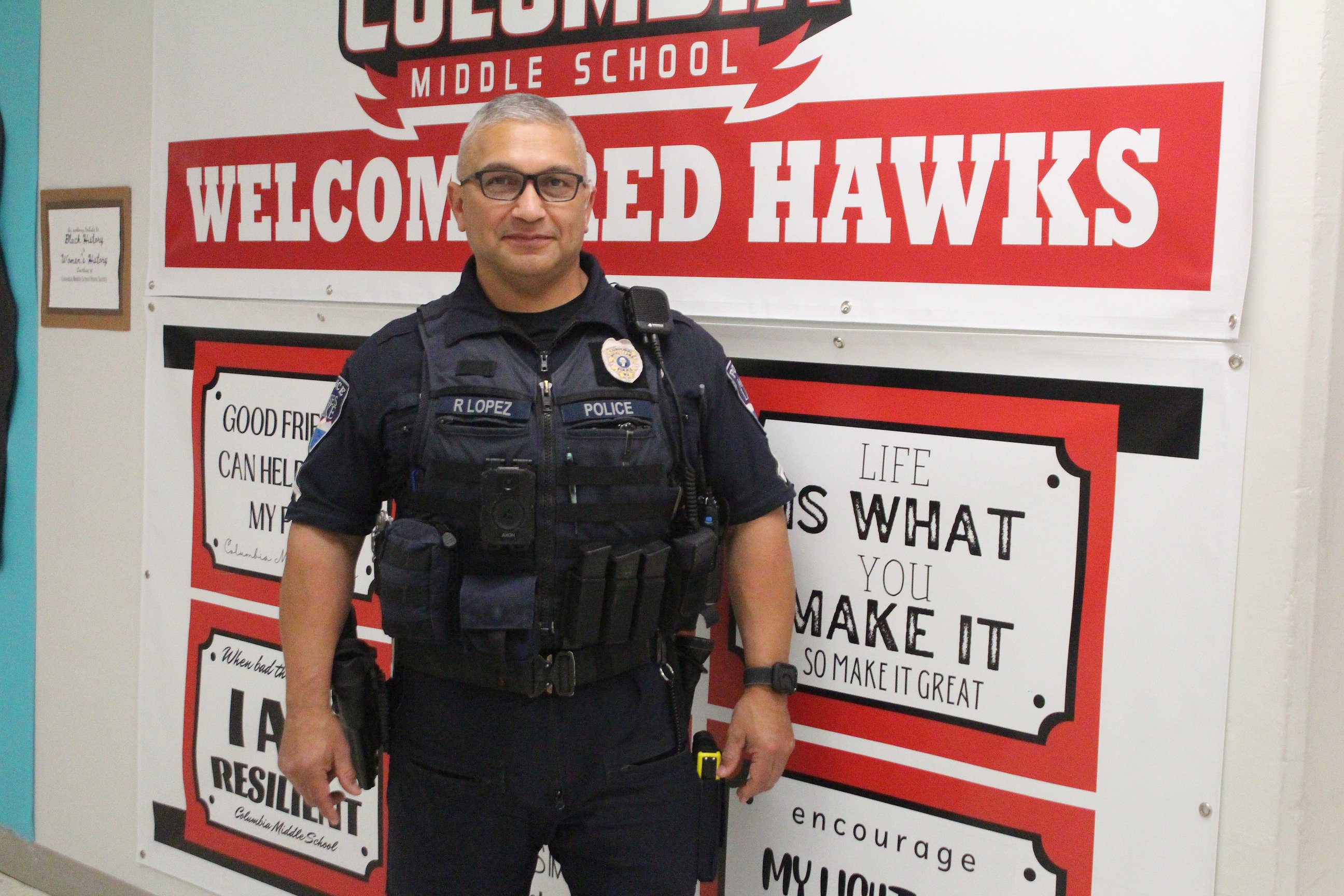School resource officers offer human connections at MLSD campuses
MOSES LAKE — Moses Lake Police Department Officer Ray Lopez said the biggest part of the job of a school resource officer — also known as an SRO — is to make connections.
“We provide resources for the school, for administrators, for staff, students, for the district,” he said. “And of course, we respond to any criminal activity. But primarily we work together with the school and the community, whether it’s counseling, whether it’s shelter, things like that. We assist with a variety of things.
Fighting crime is definitely not the biggest focus for an SRO, Lopez agreed.
“Most people look at us and (think) hey, we’re there because we want to fight crime. Well, that’s not the reason we’re there,” Lopez said. “It’s important, but it’s not the most important thing. The important thing is having those relationships with the students.”
The Moses Lake School District contracts with the MLPD for four SROs throughout the district, paying their salaries and benefits during the school year. Stefanie Lowry, the director of finance, said MLSD budgeted about $340,000 for the SRO program for the 2024-25 school year.
Moses Lake also has eight security guards who are district employees who work with the SROs, Lowry said. The district pays about $465,000 per year for its security staff, which is separate from the SRO program. Most of the money for both comes out of the educational programs and operations levy, which will be on the ballot in a special election April 25.
School resource officers are based at Moses Lake High School, Vanguard Academy, Columbia Middle School and Frontier Middle School, but they go to any school where they are needed, Lopez said. From his perspective, SROs are at school to make connections with students, staff and parents alike, and to provide help where it’s needed.
“We’re there to assist (students), to encourage them, (tell them) school is important, good behavior is important, all those things. That’s what our job is,” he said.
The goal is to connect children with things they need, not just at school, he said.
“Some students want to talk to us directly,” he said. “And that’s where we build the relationships with the students. And we make them feel comfortable. They look at us as the police — we’re there to charge, to arrest and those kinds of things. That’s what not our primary function is (at school).”
Actually, SROs are there to support students and families that are navigating situations, and to do what they can to keep that situation or challenge from getting bigger, he said. If students or staff come to them with questions, SROs try to answer them, he said.
“If we can’t, then we go out to other resources,” he said.
Lopez has been an SRO for seven years, he said, working four years, taking a break and coming back. In that time he’s seen children grow up.
“You see them at elementary, then you see them go to middle school and high school, and then they graduate, and you see them still in the community. They know you - they know by your first name and things like that. It’s a good feeling,” he said.
Moses Lake Superintendent Monty Sabin said the SROs and security staff provide an important service. Schools work better, for children, staff and parents, when children and adults at school feel secure, he said.
“It’s really important. If you don’t feel secure, it’s really difficult to focus and concentrate, to learn as well as you could if you were in a secure environment,” Sabin said.
“I know parents feel that way — they feel a lot better when they know a SRO or another security person is going to be present, and that the response will be so quick if there is an issue at the building where their kid is,” he added.
The MLSD does get a small amount of state funding for school security, enough to pay for the equivalent of about one full-time and one part-time employee. District officials choose to hire more than that because in their opinion that’s not enough to cover the entire district, Sabin said.
There is not, he said, an alternative source of funding in the district’s existing budget for that.
“That’s what (state education officials) consider, I guess, appropriate funding, is one person. For a school district of 8,500 kids,” Sabin said.
In Sabin’s opinion, the value of the SRO goes beyond school.
“Relationships really matter. The SROs are able to develop these relationships with the students, not just in our schools, but in our community when they get older,” Sabin said. “And as they get older I think that is huge. It doesn’t just impact a 12-year-old when they’re in school, but it’s years down the road. And it’s having a positive influence on our community.”
Lopez said from his perspective, the long-term impact is one of the goals of being a SRO.
“We’re hoping that we can make a change,” he said. “Now, are we going to be able to make those changes in everyone? No. But we try. We try. So that’s what our ultimate goal is, to make changes in those kids’ lives.”
Cheryl Schweizer can be reached via email at cschweizer@columbiabasinherald.com.





